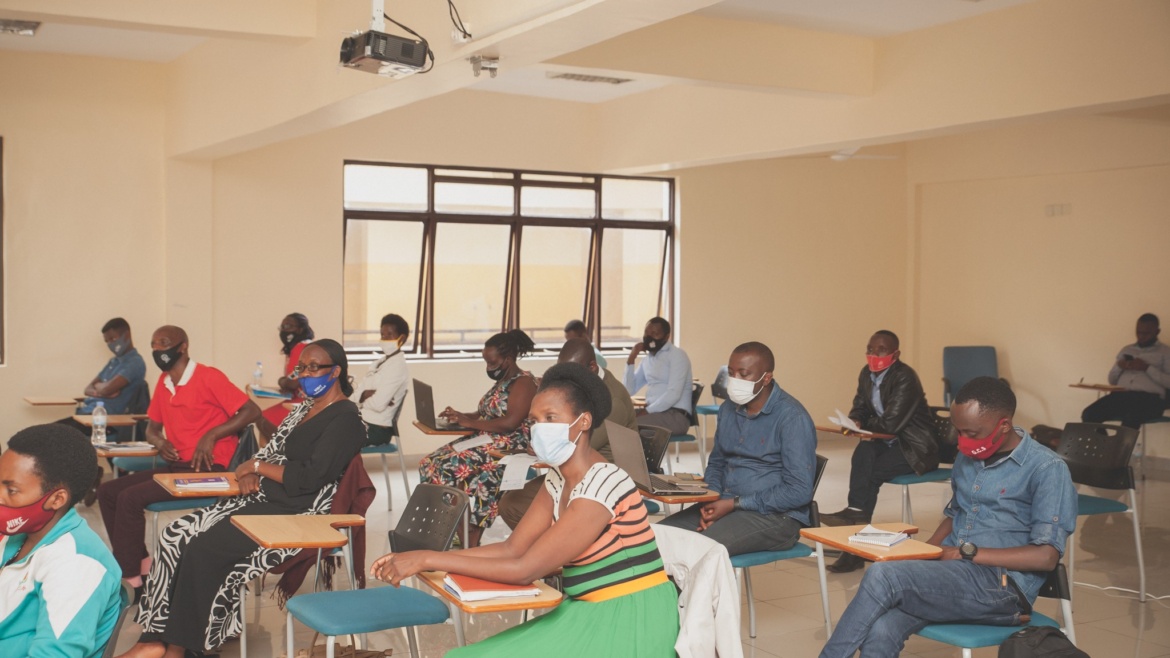In order for community-based libraries to function properly, community librarians need to receive skills to ensure that they understand how to help people visiting their respective libraries adopt a reading culture.
To help them, Umuhuza in collaboration with other partners, in 2020, organized three-day training on library management and other practices for community libraries across the country.
The training, which took place in Huye district, was part of the National Literacy Month and has attracted the participants from Southern Province. The activity is a single of many others that Umuhuza implemented in partnership with the Save the Children’s USAID funded Mureke Dusome Project in the country.
During the training some topics including reading culture, its challenges and remedies to address them were covered.
According to Jean de Dieu Hategekimana, the chairman of Community Libraries at National Level, the training helped them acquire new skills in how to better support those around them.
“The participants learned about best practices in library management and how they can better improve the culture of reading, thanks to our libraries. Community librarians needed to know how they do their work and make sure they provide report back on what they have done,” he pointed out.
The training also helped community librarians know how to report to the top leaders (at province level) who in turn report to the Kigali Public library (KPL) and then to the education ministry, he added.
The training was organized by Umuhuza in partnership with the Kigali Public Library (KPL), Save the Children and the National Itorero Commission.
Hategekimana acknowledged that although community libraries still have a long way to go in promoting a reading culture, such libraries are already making a difference.
He gave an example of the book in a community library called “Inka Yanjye,” literally means “my cow,” changing the behaviors of people who read it on how to raise cattle.
Sylvain Mudahinyuka, the managing Director of the Kigali Public Library (KPL), believes that a library to develop librarians should be fully aware of their responsibilities.
Libraries should respond to community challenges, and if there are problems of poor reading culture and family conflict, community libraries should address such problems,” he said.
He added that community libraries use volunteers as librarians and stressed that plans are being developed to reward them by offering outcome-based incentives.
“We are mobilizing partners so that we can get means, and we are mobilizing to see if community librarians can be integrated into district structures and paidmonthly salaries,”
But let us first show work and demonstrate that we have played a key role in the development of the community. We need to promote a reading culture and reading in Kinyarwanda,” he noted.
He added: “By promoting this culture, we contribute to economic development. We want libraries to be like pharmacies because libraries have medicines. We will continue to work on multiple projects for community libraries.”
Promoting reading culture is a calling
Umuhuza Executive Director Mathilde Kayitesi sees community librarians’ work to promote a reading culture as both a sacrifice and a calling.
“The work you do is a sacrifice. Promoting a culture of reading is a calling. We are very grateful to you and to our partners. We hope we will achieve a lot and that the partnership will bear fruits,” she said.
Kayitesi says: “What we do will not be futile, but sustainable. This “Mureke Dusome” project will go nowhere, we will inherit it to you, you will make it more productive, and people, especially children, will read.”
She said Umuhuza has had a two-year partnership with community libraries, but they will continue to work together even if the relationship ends and that the organization will preserve partnership with others to avail more books in community libraries.
“We wish you to be more productive and impact the community through your respective libraries. We need to promote the reading cultureof Kinyarwanda because it is scientifically proven that children should read in their native language because it can help them learn other languages easily,” she noted.
“We need to make sure that community libraries have an impact on the community and that the culture of reading spreads among many Rwandans,” she added.
Parents and Children should read
Kayitesi noted that Umuhuza plays a key role in promoting reading culture among all genders.
“Men and women should champion reading culture and instill it in their children. We mustencourage children to read at the end of school and reading books or choose their own,”she added.


